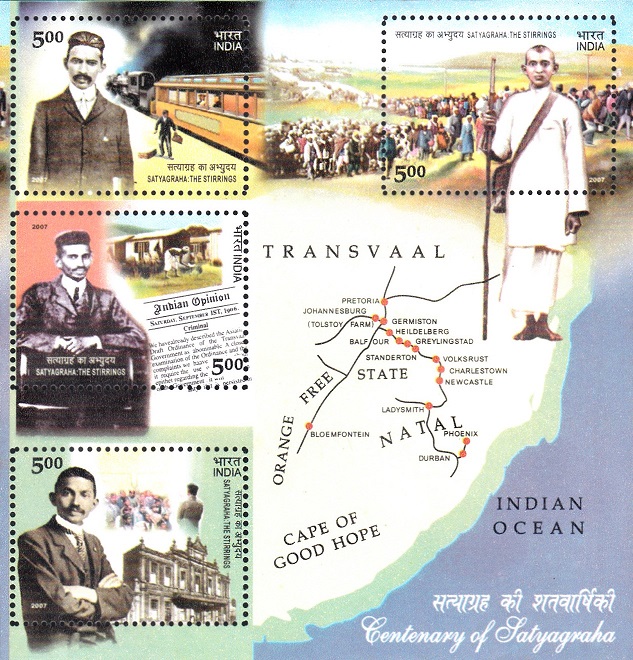
Satyagraha : The Stirrings
A Miniature Sheet consisting of 4 nos of commemorative postage stamps on the Centenary of Satyagraha, a particular form of non-violent resistance or civil resistance :
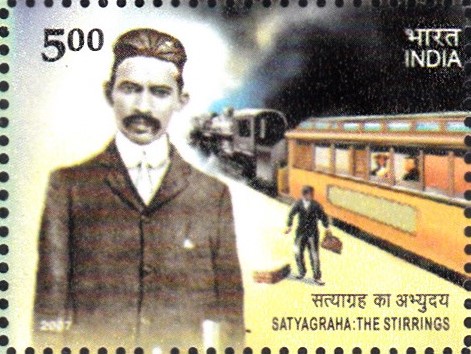
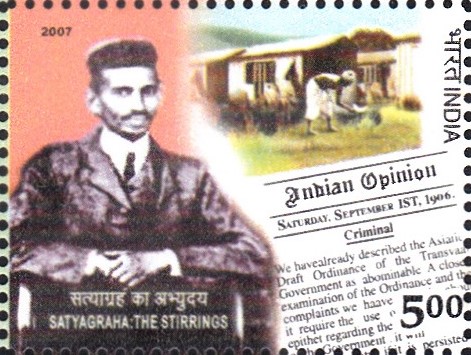
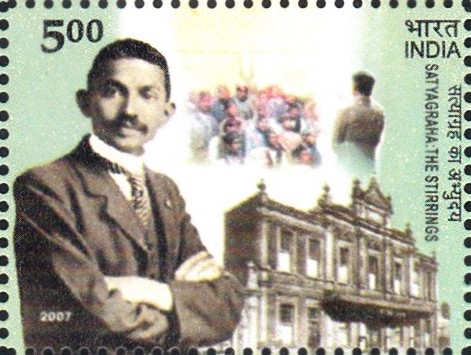
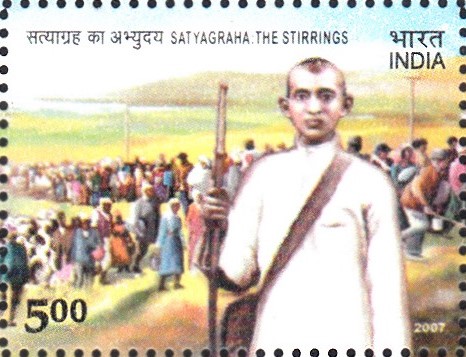
 Issued by India
Issued by India
Issued on Oct 2, 2007
Issued for : The Department of Posts is happy to issue a set of four commemorative postage stamps on the occasion of centenary of Satyagraha which portrays the stirrings of Satyagraha in a beautiful and inspiring depiction.
Credits :
Stamp & FDC : Sankha Samanta
Cancellation : Alka Sharma
Type : Miniature Sheet, Mint Condition
Colour : Multi Colour
Denomination : 500 Paise each
Stamps Printed : 0.8 Million each
Miniature Sheet : 0.2 Million
Printing Process : Photogravure
Printer : India Security Press, Nasik
About :
- Satyagraha is the philosophy of non-violent resistance most famously employed by Mohandas Karamchand Gandhi in forcing an end to the British Raj in India, beginning with his struggles in South Africa. It was in South Africa in 1893 that Gandhiji conceived of Satyagraha, which he defined as the technique of mass force based on truth and moved by non-violence.
- The technique was not born full-grown, it was developed and refined with each application, first in South Africa and later in India, as a moral response to violence, and which has subsequently spread around the world. A tactic that ultimately impelled the British to free India, this technique was first put to the test on 11 September, 1906, before a gathering of more than three thousand people “of the coloured race” who had gathered at the Empire Theatre in Johannesburg, South Africa to listen to a young Indian lawyer Mohandas Karamchand Gandhi who had promised to show the path of redemption to the oppressed of the world. And the path was Satyagraha.
- Satyagraha was an important constituent of Gandhi‘s programmes of national self-purification. When he started campaigning against the racially discriminatory measures in South Africa, Gandhi discovered that his countrymen there lacked personal and communal self-respect, courage and the willingness to organize themselves. In a memorable phrase he urged them to ‘rebel‘ against themselves. This call initiated the stirrings.
- Mahatma Gandhi coined the term Satyagraha to describe his philosophy of non-violent resistance, and he described it, thus : “Truth (Satya) implies love, and firmness (agraha) engenders and therefore serves as a synonym for force. I thus began to call the Indian movement Satyagraha, that is to say, the Force which is born of Truth and Love or Non–violence.“
- The special set of commemorative stamps is dedicated to the spirit of Satyagraha. It should make us pause to reflect on how a colossal revolution took place in India without the violence attached to revolutions that occurred in other countries of Asia and Africa and to turn the search light on oneself to find an alternative to violence, which threatens to destroy the very fabric of civilized existence.
- Text : Based on material provided by the proponent.




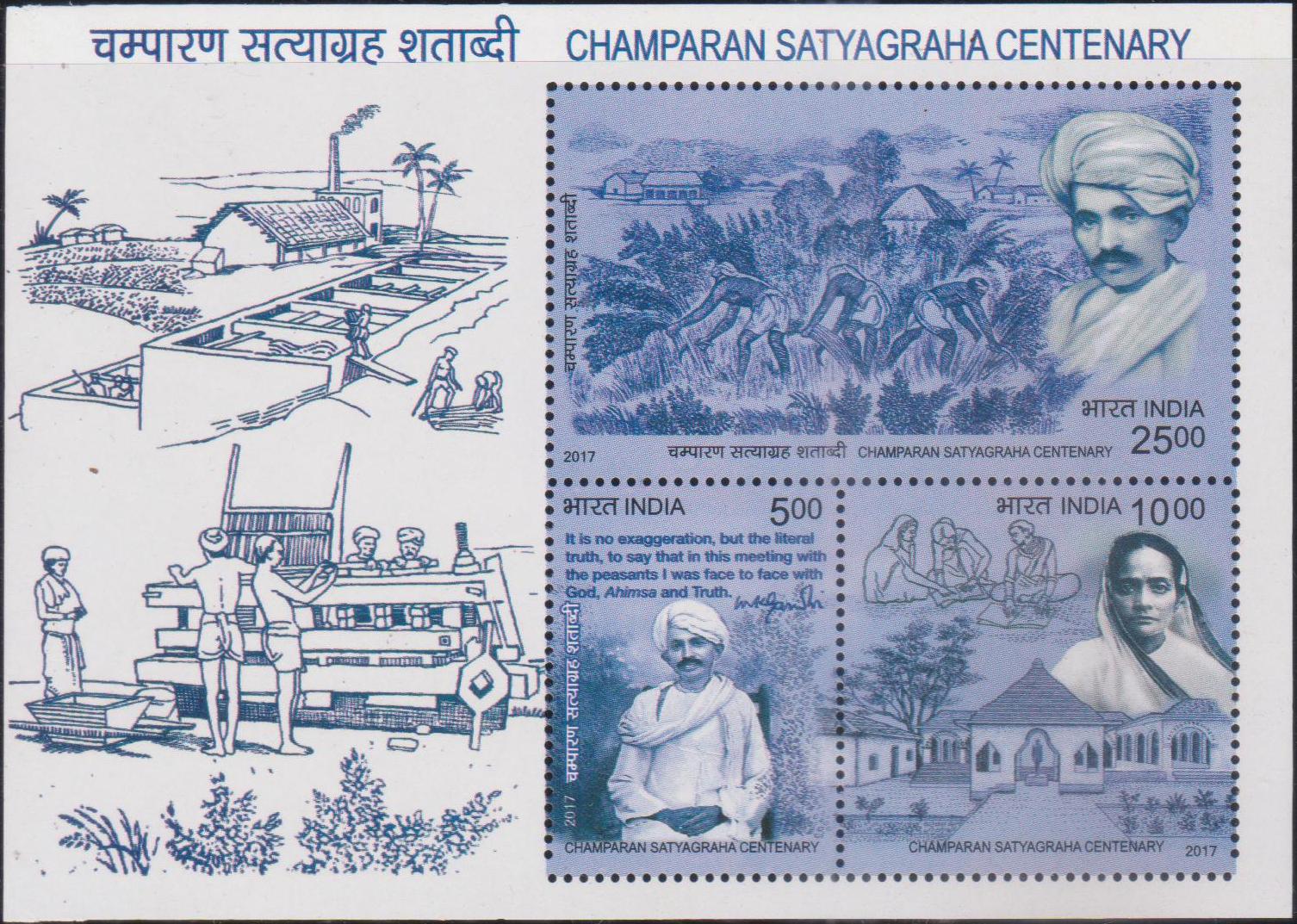
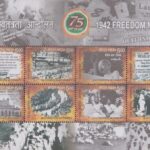
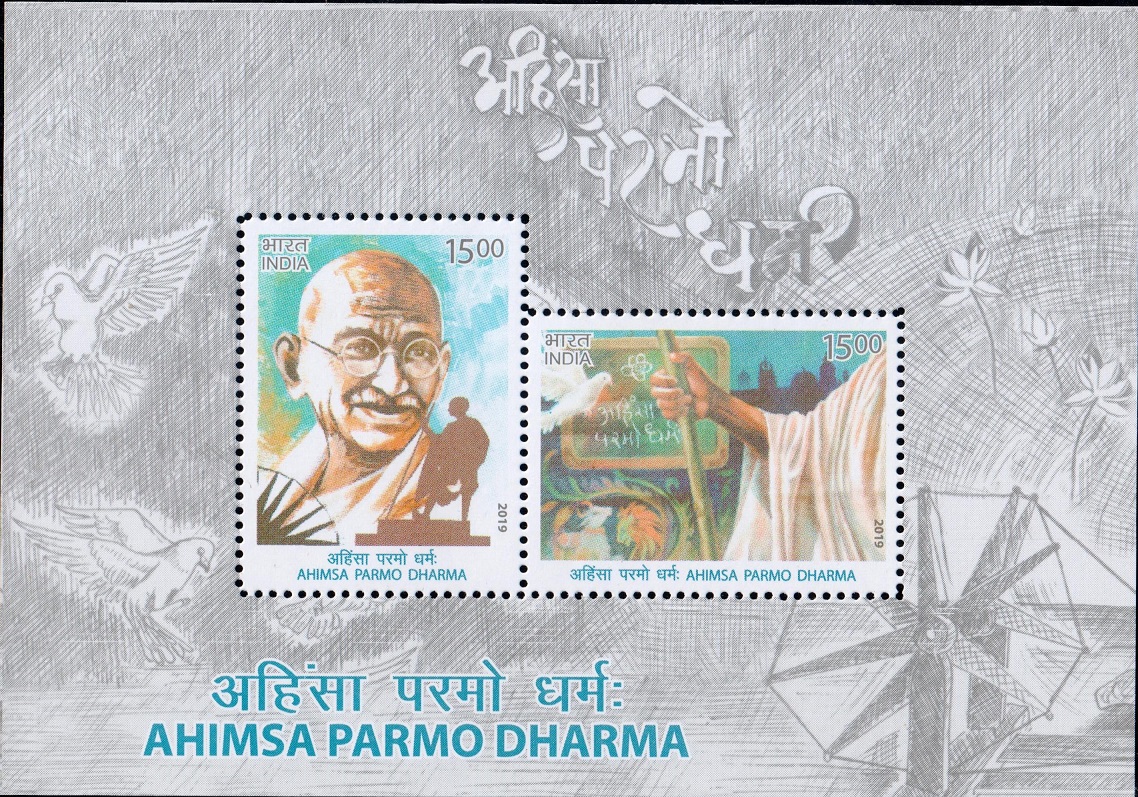

[…] Gandhi, joined the struggle for Independence, relinquishing all worldly ambitions. He offered Satyagraha on several occasions and courted imprisonment during the Salt Satyagraha Movement in 1930 and the […]
[…] 1930, he played a prominent part in the famous Satyagraha at the Kalaram Temple to gain entry into the temple, for which he had to suffer imprisonment. He […]
[…] national leaders, and other devoted workers and Satyagrahis. In 1941 he performed individual satyagrah and he took part in the mass upsurge of the ‘Quit India‘ movement in 1942. He strongly […]
[…] Bihar, where in 1917; he came to conduct the famous “Indigo Labour Enquiry” and then launched a Satyagraha against forced cultivation of indigo by poor […]
[…] Disobedience Movement in 1930’s and went to jail. In 1941, when Gandhiji started individual satyagraha against British war effort, she courted […]
[…] the sad plight of Indians living there. He started a passive resistance movement known as “Satyagraha” to fight unjust colour prejudice by pitting soul-force against physical-force. In 1896 he […]
[…] of Law and Justice in the Pant Ministry in U.P. The Ministry resigned in 1939 and Dr. Katju offered Satyagraha and was imprisoned for 18 months. After release he continued his political activities was detained […]
[…] the Utkal Pradesh Congress Committee and the same year he was imprisoned for participating in the Satyagraha movement. During imprisonment he translated the “Balmiki Ramayan“ into Oriya and […]
[…] when Mahatma Gandhi, accompanied by the Ali brothers, visited Aligarh to explain his doctrine of Satyagraha and the need to boycott educational institutions controlled by the British Government. Zakir […]
[…] He organised public meetings in Rajapalayam and in 1919, leaving his studies, he organised the Satyagraha Movement. In 1932 he was again sentenced for one year. On release from jail, Raja resumed his activities. […]
[…] the life of an active revolutionary, he went to the backward areas of Mewar in 1919-20. He started Satyagraha against the cruel oppression of the inhabitants of these places. His success in this campaign […]
[…] movement. He was one of the eleven persons selected by Mahatma Gandhi from Delhi for individual Satyagrah. Keeping in view his qualities of leadership, team work and social service, he was given a ticket […]
[…] jail. Indeed, the vision of her active participation – from her “inner promptings” – in the satyagraha movement in South Africa was, in Sarojini Naidu’s words, one of “brave, frail, hard-worn hands […]
[…] in trade union activities in Ahmedabad for two decades starting from 1922. He was jailed during the Satyagraha Movement in 1932. While in jail, with his habits of systematic study, he started reading and […]
[…] urge to serve the country more devotedly, he gave up the practice and joined Mahatma Gandhi‘s Satyagraha campaign in 1919 and freedom movement in […]
[…] his time in South Africa, he also developed the strategy known as Satyagraha (truth-force), in which campaigners went on peaceful marches and presented themselves for arrest […]
[…] of World War II led him, along with some other younger leaders, to propose the launching of a Satyagraha for Indian independence. He was arrested by the British Government for obstructing the supply […]
[…] of the Congress ministries in various provinces. An active participant, in the Individual Satyagraha in 1940, he joined the “Quit India” movement in 1942 and was detained in Ahmednagar […]
[…] held in Johannesburg on 11th September that year, Gandhi adopted his still evolving methodology of Satyagraha (devotion to the truth) or nonviolent protest, for the first […]
[…] he was twice elected General Secretary and twice President. In 1939, he led the Praja Mandal’s Satyagraha for achievement of civil liberties and suffered a six-month imprisonment. In 1947 he was appointed […]
[…] Mahatma Gandhi appeared on the Indian scene and launched his Satyagraha Movement, Shri Vaswani was one of the earliest supporters of his movement and a close associate of […]
[…] in 1896 when he went there on a lawyer’s assignment. Public life for both of them began with the Satyagrah to reinstitute the prestige of Indians in South Africa in 1902 and the establishment of the Phoenix […]
[…] of the nation and is a well-known name internationally for his doctrine of nonviolent protest (satyagraha) to achieve political and social progress. Bapu’s struggle culminated in India’s Independence […]
[…] under the name “Sumitranandan Pant”. It was shortly after Mahatma Gandhi’s call for Satyagraha Movement that Shri Pant went to Sri Aurobindo’s Ashram in Pondicherry and it was from that point onwards […]
[…] in convincing Gandhiji and was allowed to stay in the Ashram. The main characteristics of a Satyagrahi are justice, non-violence, patriotism, purity, self-control, conviction, boldness, humbleness, […]
[…] Kitchlew and Dr. Satyapal. The leaders had been arrested for organising the very successful Satyagraha movement against the Rowlatt Act. There were other causes of unhappiness in Punjab, especially […]
[…] Delhi, in 1937, Ranbir Singh joined the freedom struggle and was arrested during the individual Satyagraha in 1941. In all, he underwent three and a half years’ rigorous imprisonment in eight […]
[…] reduce unemployment and boost the production of food grains. To achieve this object he started Satyagraha in […]
[…] judgement. Thillaiyadi Valliammai actively canvassed and traveled extensively. On 28th Oct. 1913 Satyagraha was launched by Kasturba in which Thillaiyadi Valliammai took the plunge. On 22nd December, 1913 […]
[…] the daily newspaper “India” in Tamil and was its Managing Director till 1933. In the Individual Satyagraha Movement, he was imprisoned for 9 months (1940-41). Once again, he played an exemplary role in Quit […]
[…] after release he took up the post for one day and resigned. He took an active part in individual satyagraha and the ‘Quit India’ […]
[…] six months imprisonment for participating in the Bardoli Satyagrah along with Sardar Patel. In the satyagrah of 1930 too, he was jailed for two years. In 1941, when communal riots broke out in Ahmedabad, he […]
[…] South Africa he evolved the method of action that will forever be associated with his name – Satyagraha, passive resistance. With this he returned in India, where his countrymen were striving to free […]
[…] the movement was the strongest and most widespread. Amritsar was in the vanguard of this “satyagrah“. The authorities thought that they could suppress the spontaneous expression of the […]